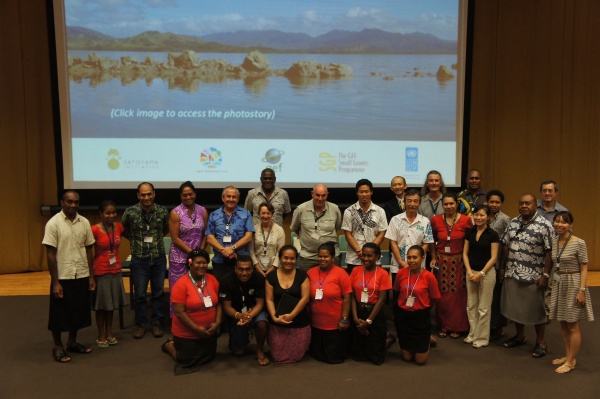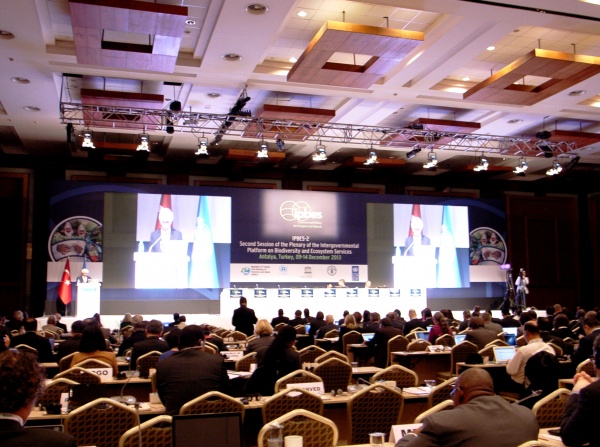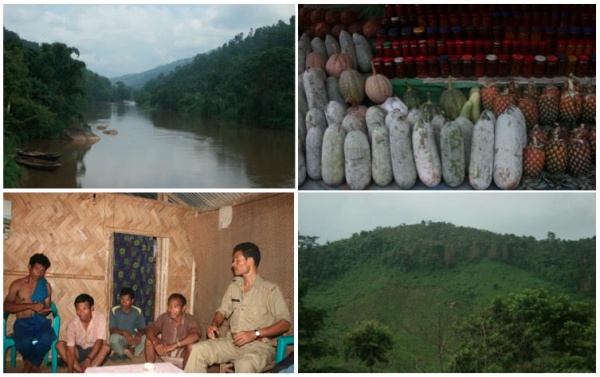Dear subscriber,
Happy New Year from the IPSI Secretariat in Yokohama, Japan! We thank you for your continued support of IPSI, and wish you the best in the coming year.
In this month's Newsletter, we are pleased to announce the news that the Satoyama Initiative's own Programme Director, Dr. Kazu Takemoto, has been named Director of the newly-formed United Nations University Institute for the Advanced Study of Sustainability (UNU-IAS). For more on the new Institute and Dr. Takemoto's appointment, please see the item below.
This issue also contains information on IPSI's activities, including our parallel session at the Ninth Pacific Islands Conference on Nature Conservation and Protected Areas, held in December 2013 in Suva, Fiji, and our participation in the Second Meeting of the Intergovernmental Platform on Biodiversity & Ecosystem Services (IPBES-2), held in December 2013 in Antalya, Turkey. We are also happy to introduce one of the Partnership's newest members, IORA Ecological Solutions, based in New Delhi, India. We hope you will find the contents interesting and helpful for your SEPLS-related activities.
Thank you for your continued support of IPSI and our members' activities.
IPSI Secretariat
Dr. Takemoto Named Director of New UNU-IAS
As of 1 January 2014, the Satoyama Initiative’s host organization, the United Nations University Institute of Advanced Studies, has merged with the United Nations University Institute for Sustainability and Peace to form a new body called the United Nations University Institute for the Advanced Study of Sustainability (UNU-IAS). We are pleased to announce that the International Satoyama Initiative’s Programme Director, Dr. Kazu Takemoto, has been named Director of this new Insititute, effective 1 January, 2014.
UNU-IAS builds on a strong tradition of UNU research and capacity development in Japan, which is undertaken in collaboration with a global network of professionals and scholars. Its research programme will focus on high-level policymaking based on aspects of environmental research, including the science of sustainability, biodiversity and environmental governance.
The full press release regarding Dr. Takemoto’s appointment can be found here.
For the time being, Dr. Takemoto plans to continue to serve as ISI Programme Director in addition to his duties as Director of the new Institute. If you have any questions regarding these changes, please feel free to contact the IPSI Secretariat at any time.

Ninth Pacific Islands Conference on Nature Conservation and Protected Areas
Members of the Secretariat of the International Partnership for the Satoyama Initiative (IPSI) traveled to Suva, Fiji, to take part in the Ninth Pacific Islands Conference on Nature Conservation and Protected Areas, held by IPSI and the Secretariat for the Pacific Regional Environment Programme (SPREP), on 4 December, 2013. A parallel session was also held, entitled "Challenges and Opportunities for the International Partnership for the Satoyama Initiative (IPSI) from Pacific Perspectives".
Speakers at the parallel session provided experiences with Socio-Ecological Production Landscapes and Seascapes (SEPLS), with a focus on lessons and challenges specific to the Pacific region. Case studies were also presented, and panel discussions held between SEPLS practitioners from around the region. Some of the issues that were raised were the particular importance of SEPLS in the region for biodiversity conservation, human well-being, and local resilience, as well as the need for integrated management and greater awareness within local communities of the importance of sustainable use of natural resources.
The groundwork was also laid for further meetings with SPREP and other stakeholders in the future. The event provided a venue for a great deal of information-sharing, and also highlighted the importance of collaboration within relevant networks and partnerships such as IPSI.
More information on the conference can be found here.

Second Meeting of the Intergovernmental Platform on Biodiversity & Ecosystem Services (IPBES-2)
IPBES is an independent intergovernmental body open to all member countries of the United Nations, and provides a mechanism recognized by both the scientific and policy communities to synthesize, review, assess and critically evaluate relevant information and knowledge generated worldwide by governments, academia, scientific organizations, non-governmental organizations, and indigenous communities. The second meeting of the Platform's Plenary (IPBES-2) was held from 9 to 14 December 2013 in Antalya, Turkey.
IPSI Secretariat members in attendance were pleased to see many familiar faces from IPSI member organizations at the meeting. These even included IPSI Steering Committee members such as Professor Alfred Oteng-Yeboah of the Ghana National Biodiversity Committee, Ms. Somaly Chan of the Cambodia Ministry of the Environment, Ms. Joji Carino of Forest Peoples Programme, and Mr. Naohisa Okuda of the Ministry of the Environment of Japan, among many others.The IPBES framework is extremely important for the concepts of the Satoyama Initiative and SEPLS conservation and promotion, so the meeting provided an excellent opportunity to connect with many IPSI member and other organizations.
More information on IPBES and its events can be found here.

New Member Introduction: IORA Ecological Solutions
IORA Ecological Solutions is an environmental finance, policy advisory and project development firm founded in 2009 in New Delhi, India. Its mission is to enable sustainable development in India by promoting ecosystem conservation and low carbon technologies through structured financing and distribution models.
IORA has pioneered the development of community based REDD+ mechanisms, biodiversity conservation finance and community based clean energy projects in India with projects ranging from conservation of community owned forests in Northeast India, development of PES scheme for mango diversity conservation in U.P, designing a community based waste-to-energy program and participating in the development of a REDD+ MRV system for India. IORA adopts a whole-systems approach to design effective environmental programs that focus extensively on stakeholder consultation and engagement across all levels of program design to ensure viability and adoption.
By 2020, IORA’s mission is: to bring a minimum of 10% of India's forests under a regime of comprehensive spatially planned community-based conservation planning; develop conservation plans for genetic variety among 3 major food crops in India; develop a national MRV system for forest and agrobiodiversity in India; develop a system for corporate biodiversity impact assessment; and distribute renewable energy devices for cooking and electricity across 1 million families in rural India.
For more information, visit the official IORA Ecological Solutions website.

IPSI Newsletter, January 2014
Dear subscriber,
Happy New Year from the IPSI Secretariat in Yokohama, Japan! We thank you for your continued support of IPSI, and wish you the best in the coming year.
In this month's Newsletter, we are pleased to announce the news that the Satoyama Initiative's own Programme Director, Dr. Kazu Takemoto, has been named Director of the newly-formed United Nations University Institute for the Advanced Study of Sustainability (UNU-IAS). For more on the new Institute and Dr. Takemoto's appointment, please see the item below.
This issue also contains information on IPSI's activities, including our parallel session at the Ninth Pacific Islands Conference on Nature Conservation and Protected Areas, held in December 2013 in Suva, Fiji, and our participation in the Second Meeting of the Intergovernmental Platform on Biodiversity & Ecosystem Services (IPBES-2), held in December 2013 in Antalya, Turkey. We are also happy to introduce one of the Partnership's newest members, IORA Ecological Solutions, based in New Delhi, India. We hope you will find the contents interesting and helpful for your SEPLS-related activities.
Thank you for your continued support of IPSI and our members' activities.
IPSI Secretariat
Dr. Takemoto Named Director of New UNU-IAS
As of 1 January 2014, the Satoyama Initiative’s host organization, the United Nations University Institute of Advanced Studies, has merged with the United Nations University Institute for Sustainability and Peace to form a new body called the United Nations University Institute for the Advanced Study of Sustainability (UNU-IAS). We are pleased to announce that the International Satoyama Initiative’s Programme Director, Dr. Kazu Takemoto, has been named Director of this new Insititute, effective 1 January, 2014.
UNU-IAS builds on a strong tradition of UNU research and capacity development in Japan, which is undertaken in collaboration with a global network of professionals and scholars. Its research programme will focus on high-level policymaking based on aspects of environmental research, including the science of sustainability, biodiversity and environmental governance.
The full press release regarding Dr. Takemoto’s appointment can be found here.
For the time being, Dr. Takemoto plans to continue to serve as ISI Programme Director in addition to his duties as Director of the new Institute. If you have any questions regarding these changes, please feel free to contact the IPSI Secretariat at any time.

Ninth Pacific Islands Conference on Nature Conservation and Protected Areas
Members of the Secretariat of the International Partnership for the Satoyama Initiative (IPSI) traveled to Suva, Fiji, to take part in the Ninth Pacific Islands Conference on Nature Conservation and Protected Areas, held by IPSI and the Secretariat for the Pacific Regional Environment Programme (SPREP), on 4 December, 2013. A parallel session was also held, entitled "Challenges and Opportunities for the International Partnership for the Satoyama Initiative (IPSI) from Pacific Perspectives".
Speakers at the parallel session provided experiences with Socio-Ecological Production Landscapes and Seascapes (SEPLS), with a focus on lessons and challenges specific to the Pacific region. Case studies were also presented, and panel discussions held between SEPLS practitioners from around the region. Some of the issues that were raised were the particular importance of SEPLS in the region for biodiversity conservation, human well-being, and local resilience, as well as the need for integrated management and greater awareness within local communities of the importance of sustainable use of natural resources.
The groundwork was also laid for further meetings with SPREP and other stakeholders in the future. The event provided a venue for a great deal of information-sharing, and also highlighted the importance of collaboration within relevant networks and partnerships such as IPSI.
More information on the conference can be found here.

Second Meeting of the Intergovernmental Platform on Biodiversity & Ecosystem Services (IPBES-2)
IPBES is an independent intergovernmental body open to all member countries of the United Nations, and provides a mechanism recognized by both the scientific and policy communities to synthesize, review, assess and critically evaluate relevant information and knowledge generated worldwide by governments, academia, scientific organizations, non-governmental organizations, and indigenous communities. The second meeting of the Platform's Plenary (IPBES-2) was held from 9 to 14 December 2013 in Antalya, Turkey.
IPSI Secretariat members in attendance were pleased to see many familiar faces from IPSI member organizations at the meeting. These even included IPSI Steering Committee members such as Professor Alfred Oteng-Yeboah of the Ghana National Biodiversity Committee, Ms. Somaly Chan of the Cambodia Ministry of the Environment, Ms. Joji Carino of Forest Peoples Programme, and Mr. Naohisa Okuda of the Ministry of the Environment of Japan, among many others.The IPBES framework is extremely important for the concepts of the Satoyama Initiative and SEPLS conservation and promotion, so the meeting provided an excellent opportunity to connect with many IPSI member and other organizations.
More information on IPBES and its events can be found here.

New Member Introduction: IORA Ecological Solutions
IORA Ecological Solutions is an environmental finance, policy advisory and project development firm founded in 2009 in New Delhi, India. Its mission is to enable sustainable development in India by promoting ecosystem conservation and low carbon technologies through structured financing and distribution models.
IORA has pioneered the development of community based REDD+ mechanisms, biodiversity conservation finance and community based clean energy projects in India with projects ranging from conservation of community owned forests in Northeast India, development of PES scheme for mango diversity conservation in U.P, designing a community based waste-to-energy program and participating in the development of a REDD+ MRV system for India. IORA adopts a whole-systems approach to design effective environmental programs that focus extensively on stakeholder consultation and engagement across all levels of program design to ensure viability and adoption.
By 2020, IORA’s mission is: to bring a minimum of 10% of India's forests under a regime of comprehensive spatially planned community-based conservation planning; develop conservation plans for genetic variety among 3 major food crops in India; develop a national MRV system for forest and agrobiodiversity in India; develop a system for corporate biodiversity impact assessment; and distribute renewable energy devices for cooking and electricity across 1 million families in rural India.
For more information, visit the official IORA Ecological Solutions website.



